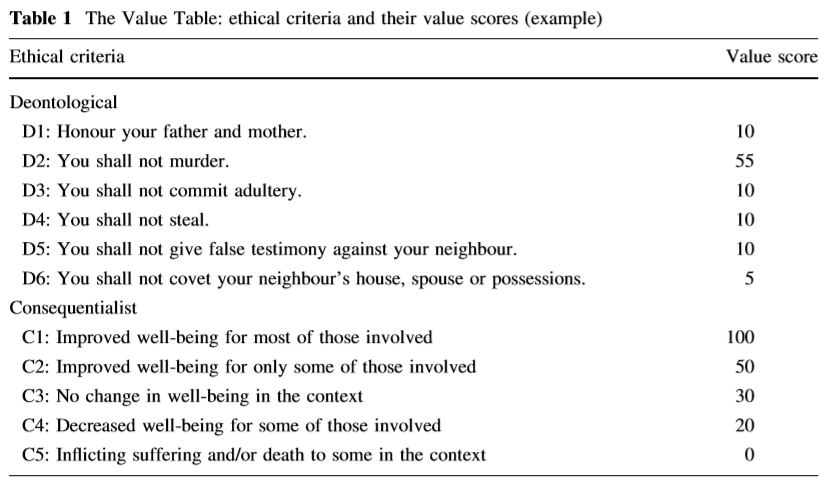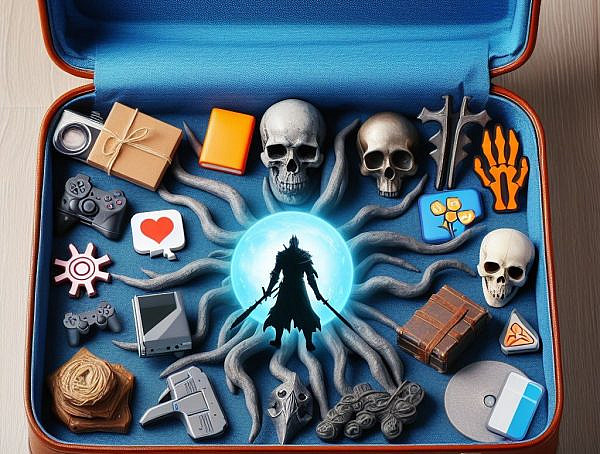In his article “Decision Theory Based Model of Game Morality,” Tony Rosqvist sets out a method of measuring the morality of players in both strategy and roleplaying games. The model he outlines allows the decisions of a player or NPC to be evaluated on the basis of three ethical philosophies: deontology, consequentialism, and Rule Consequentialism. The philosophies are explained as follows:
- Deontology: an action is “good” if it aligns with a set of rules. An action is good in and of itself.
- Consequentialism (utilitarianism): the best action is that which benefits the most individual people. The ends justify the means.
- Rule Consequentialism: The best action does not go against a set of rules, called duties, which lead to the best outcome for the community. A blend of both.
While games have not yet reached the point where they are effectively teaching ethics, Rosqvist cites the potential of games to do so and references a separate study suggesting that this is possible if the player identifies with the character and the player can relate the game events to their own life.
Rosqvist proposes what he terms the Scale of Morality, but in order for it to work, game designers need to set up values for each decision in their game. These values will correspond to a set of rules (the golden rule is given as an example) and how the choice will impact those involved.

(Rosqvist, p. 185) This shows how the Ethical Value is determined. In the deontological division, a total of 100 would represent the most ethical choice. In terms of a consequentialism, each decision can only have one outcome, the best being C1, also 100.
A rule consequentialist would look at both deontological and consequentialist ethical values and divide each total score in half and add them together to see which choice is the most ethical.
The point of this scale is that, once set up by the game designers, the sum of choices made by the player or NPCs will show whether they make ethical choices as a deontologist, a consequentialist, or as a balance of each and, thus, a rule consequentialist.
After explaining some in depth examples of how the system can be used, Rosqvist suggests that this scale can be best applied to strategy and role-playing games. These are the most preferable types of games because they give the character ways to infer the impact of their decisions based on their interaction with the other characters and the world.
Rosqvist raises the point that it is up to designers to deal with how players will be able to predict the outcome of their behaviors and how complex the web of intertwined dependencies may be. If a consequence is uncertain, players may have to “take the risk of hindsight wisdom and learning based on regret” (Rosqvist, p. 191).
It is also difficult to compare morality between players of the same game since player experiences can be very different. Players who have the option to make impactful decisions may have dramatically different experiences of the game. Admitting all this, Rosqvist holds to the idea that the ethical principles need to be fixed. Even then, in a perfectly comparable scenario where everything is equal in terms of individual player’s ethics before the game experience, comparing ethical behavior and moral valuation will be near impossible. This is because the players’ perceptions of a consequence may be different based on different playstyles or in-game observations.
Source: Rosqvist, T. (2018). Decision Theory Based Model of Game Morality. The Computer Games Journal, 7(3), 181-192. https://doi.org/10.1007/s40869-017-0049-0
Picture: Lady Justice by jessica45 https://bit.ly/2y6C0UA (CC0)
You might also like
More from Game Research Highlights
How do you want to do this? – A look into the therapeutic uses of role-playing games
Can playing RPGs contribute positively to your wellbeing? A recent study aims to find out how RPGs are being used …
Eldritch horrors and tentacles – Defining what “Lovecraftian” is in games
H.P. Lovecrafts legacy lives today in the shared world of Cthulhu Mythos and its iconic monsters. Prema Arasu defines the …
Are Souls Games the Contemporary Myths?
Dom Ford’s Approaching FromSoftware’s Souls Games as Myth reveals the Souls series as a modern mythology where gods fall, desires …















